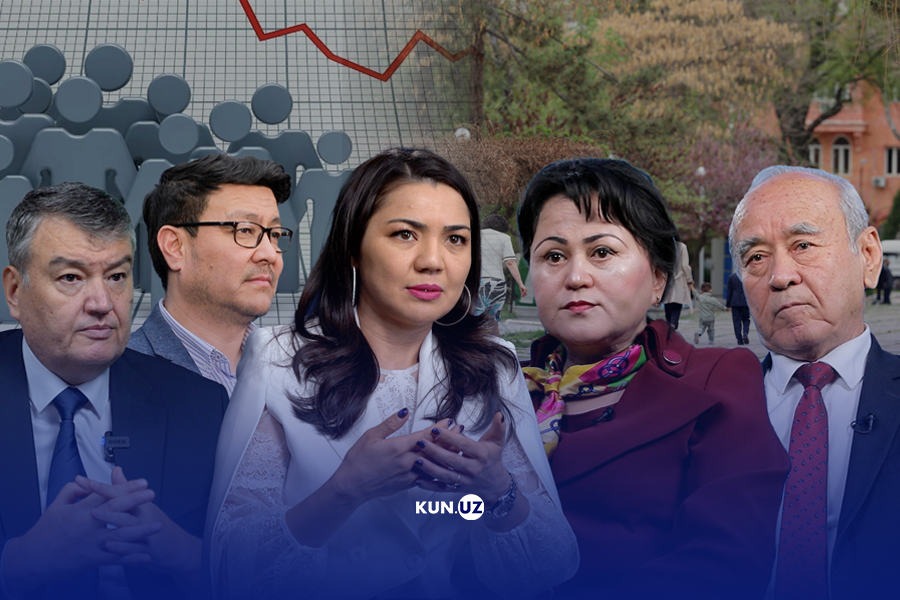Uzbekistan's growing population: Turning numbers into strength
Uzbekistan's population is set to reach 40 million in the near future. Such rapid growth is certainly encouraging, but considering that there are countries with populations exceeding 100 million that still suffer from poverty, it becomes clear that demographic growth alone cannot work miracles. Kun.uz sought the opinions of various experts on this matter.
According to them, as the population grows, human capital must also increase. If state policies are not properly implemented, population growth may simply lead to a rise in Uzbekistan's labor force exportation.

Uzbekistan currently ranks 43rd globally in terms of population size. Looking higher on the list, we see countries like Afghanistan (42 million), Pakistan (241 million), Nigeria (224 million), Bangladesh (170 million), Ethiopia (109 million), and the Democratic Republic of Congo (105 million). These countries have significantly larger populations, but their economic development leaves much to be desired.
For instance, take Nigeria, which is among the top ten most populous countries. Despite having over 232 million people and being rich in oil, Nigeria remains impoverished. Oil accounts for just 9% of its GDP. Most of its population relies on agriculture for survival, but the income from agriculture does not keep pace with population growth. Once a food exporter, Nigeria now has to import food to meet its needs.
Similarly, Ethiopia, which rounds out the top ten most populous countries, is also a poor nation. With a population exceeding 132 million, its GDP stands at $145 billion. The country has borrowed nearly $30 billion from abroad and hopes to become a middle-income economy by 2025.
The quality of demographic growth is as important as the growth itself
Economist Shukhrat Rasul emphasizes that while a growing population is good, there are critical aspects that need to be addressed and tasks that must be undertaken to ensure this growth brings positive results.
"According to economic logic, population growth should lead to economic development. More people mean more labor resources, producers, goods, services, and consumers. At its core, the economy revolves around the consumption of goods and services. In the modern world, an increase in the number of consumers should drive economic growth.
However, demographic growth does not always translate to economic growth. It can only lead to progress if it is qualitative. If the state elite is irresponsible, disregards market economic principles, and is disconnected from the people, no development will occur. It's not enough to simply increase the population. People must be turned into economic assets by providing them with quality housing, education, healthcare, clean drinking water, clean air, and access to energy resources," he says.
Strengthening the middle class is key to population growth
Population is one of the factors that determine a country's geopolitical strength. A nation cannot achieve great economic power with a small population. However, it is also necessary for this population to have potential. Political scientist Kamoliddin Rabbimov notes that small, sparsely populated countries cannot be powerful.
"There is a strong, intrinsic link between economic power and population size. It is impossible to achieve great economic strength with a small population. Currently, Uzbekistan ranks second in the CIS in terms of population size and leads the region in population growth rate.
If population growth is of poor quality, it will always have negative consequences. But if the growing population comprises a solid middle class, neither extremely rich nor extremely poor, this is highly beneficial. A large population reflects the energy of a state and society. If economic, political, and administrative reforms are implemented correctly and the poor and impoverished segments of the population diminish, demographic growth will contribute to economic strength," the political scientist explains.
Population growth also demands the development of essential living infrastructure, including housing, food, job opportunities, quality healthcare systems, education, and financial stability. While it is exciting to talk proudly about a population exceeding 40 million by 2030, it is essential to think about the other side of the equation starting now.
Recommended
List of streets and intersections being repaired in Tashkent published
SOCIETY | 19:12 / 16.05.2024
Uzbekistan's flag flies high on Oceania's tallest volcano
SOCIETY | 17:54 / 15.05.2024
New tariffs to be introduced in Tashkent public transport
SOCIETY | 14:55 / 05.05.2023
Onix and Tracker cars withdrawn from sale
BUSINESS | 10:20 / 05.05.2023
Latest news
-
Uzbekistan ranks fourth among CIS countries in mobile internet speed
SOCIETY | 19:10 / 25.07.2025
-
The Maldives – The Perfect Choice for a Halal-Friendly Holiday
SOCIETY | 19:00 / 25.07.2025
-
Tashkent hotel owner jailed for 8 years after deadly gas leak kills three, including two Russian citizens
SOCIETY | 18:29 / 25.07.2025
-
Uzbek national wanted for insulting the president extradited from Azerbaijan
SOCIETY | 18:26 / 25.07.2025
Related News

12:16 / 23.07.2025
Emigration from Uzbekistan rises by 10% in first half of 2025

17:37 / 22.07.2025
Divorce rates rise while marriage numbers fall in Uzbekistan

20:08 / 08.07.2025
Uzbekistan’s permanent population nears 38 million

20:27 / 09.06.2025



